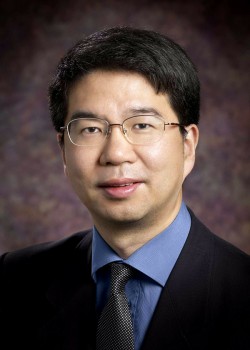Jason Cong
University of California, Los Angeles – USA
Wednesday, Aug. 29 – 9:00h – Malbec B

Jason Cong
KEYNOTE:
Automatic Customizable Computing:
From DSLs to FPGAs for Deep Learning and Beyond
In SOCC’2006, my group presented an invited paper on xPilot – the high-level synthesis (HLS) tool developed at UCLA for automatic synthesis of behavior-level C/C++ specifications into highly optimized RTL code. In the same year, The startup company AutoESL was formed to commercialize our research on HLS – an effort that many EDA companies tried but failed for over two decades. Nevertheless, the AutoESL tool (renamed to Vivado HLS after Xilinx acquisition in 2011) becomes probably the most successful and widely used HLS tool for FPGAs. As we come to the end of Moore’s Law scaling, HLS playes a critical role in enabling customizable computing, which emphasizes extensive use of customized accelerators on programmable fabrics for much greater performanc and energy efficiency. With Intel’s $17B acquistion of Altera in 2015 and Amazon’s introduction of FPGAs in its AWS public cloud in 2017, customizable computing is going from advanced research into mainstream computing.
In this talk, I shall first review the progress we made on HLS. Then, I talk about our effort on developing an automated compilation flow from high-level programming languages to FPGAs for customizable computing. I shall present our recent effort on source-code level transformation and optimization for customizable computing, including support of high-level domain-specific languages (DSL) for deep learning (with Caffe or TensorFlow), imaging processing (with Halide), and big-data processing (with Spark), and exploration of microarchictecture templates, such as systolic arrays, stencils, and CPP (composable parallel and pipelined), for efficient support of these application domains.
Speaker’s Biography:
JASON CONG received his B.S. degree in computer science from Peking University in 1985, his M.S. and Ph. D. degrees in computer science from the University of Illinois at Urbana-Champaign in 1987 and 1990, respectively. Currently, he is a Chancellor’s Professor at the Computer Science Department of University of California, Los Angeles, the director of Center for Domain-Specific Computing (CDSC), co-director of UCLA/Peking University Joint Research Institute in Science and Engineering, and co-director of the VLSI CAD Laboratory. He served as the chair the UCLA Computer Science Department from 2005 to 2008. Dr. Cong is also a distinguished visiting professor at Peking University and the director of PKU Center for Energy-Efficient Computing and Applications (CECA). Dr. Cong’s research interests include synthesis of VLSI circuits and systems, programmable systems, novel computer architectures, nano-systems, and highly scalable algorithms. He has over 350 publications in these areas, including 7 best paper awards and the 2011 ACM/IEEE A. Richard Newton Technical Impact Award in Electric Design Automation. He was elected to an IEEE Fellow in 2000 and ACM Fellow in 2008. He is the recipient of the 2010 IEEE Circuits and System (CAS) Society Technical Achievement Award “For seminal contributions to electronic design automation, especially in FPGA synthesis, VLSI interconnect optimization, and physical design automation.”
Dr. Cong has graduated 30 PhD students. A number of them are now faculty members in major research universities, including Cornell, Georgia Tech., Peking University, Purdue, SUNY Binghamton, UCLA, UIUC, and UT Austin. Four of them were co-founders, together with Dr. Cong, of two startups originated from UCLA – Aplus Design Technologies (acquired by Magma in 2003, now part of Synopsys) and AutoESL Design Technologies (acquired by Xilinx in 2011). Others are in key R&D or management positions in various companies related to the information technologies, such as Bloomberg, Broadcom, Cadence, Google, IBM, Intel, Micron, Synopsys, and Xilinx.
